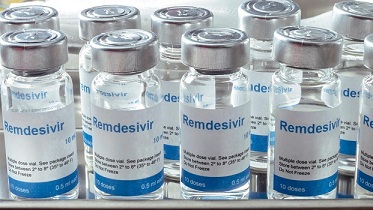COVID-19 Drugs: Study Published In Journal Of The Heart Rhythm Society Warns That Remdesivir Can Cause Dangerously Low Heart Rate In COVID-19 Patients
Source: COVID-19 Drugs Jun 30, 2021 3 years, 9 months, 3 weeks, 5 days, 6 hours, 34 minutes ago
Remdesivir the controversial drug that was deemed to be ineffective in WHO’S SolidarityTrial (
https://www.thailandmedical.news/news/latest-who-s-solidarity-drug-trial-shows-that-remdesivir-is-not-the-least-effective-in-treating-covid-19) but is still being approved as a drug to treat COVID-19 under EUA status in the United States by the no longer credible US FDA is now facing more backlash after the publication of a new case study in the peer reviewed Journal of the Heart Rhythm Society in America.
https://www.heartrhythmcasereports.com/article/S2214-0271(21)00100-7/fulltext

In the case report, after beginning treatment with remdesivir for COVID-19, a female patient experienced significant
bradycardia, or low heart rate. Her physicians used a dopamine infusion to stabilize her through the five-day course of remdesivir treatment, and her cardiac condition resolved itself at the end of the treatment.
The overpriced drug Remdesivir has become the standard of care for COVID-19 pneumonia In the United States and other stupid countries following American treatment protocols but there is a paucity of data on its cardiac effects.
Dr Jomel Patrick Jacinto, DO, Lead Author, HCA Healthcare/USF Morsani College of Medicine GME Programs, Regional Medical Center Bayonet Point, Florida told Thailand Medical News, "While it is known to be well tolerated and effective, it's critical to note its potential adverse effects on the cardiovascular system. To our knowledge, this is the first reported case of remdesivir-induced hemodynamically unstable sinus bradycardia."
The female patient arrived at the hospital in respiratory distress with abnormally rapid breathing, and she tested positive for COVID-19. She was admitted to the intensive care unit and was started on standard COVID-19 treatment protocol, including antiviral therapy with remdesivir. Twenty hours after administration of the first dose, her vitals revealed very low blood pressure and a heart rate as low as 38 beats per minute. An electrocardiogram found marked sinus bradycardia.
It must be noted that the female patient lacked any prior cardiac history and had normal telemetry monitor and ECG findings prior to receiving remdesivir.
The patient was started on a dopamine drip and maintained normal sinus rhythm with a heart rate of 60-65 beats per minute. Eighteen hours after her last dose of remdesivir, the dopamine was titrated off, and the patient was stable, with normal ECG findings.
Dr Jacinto said that in this case, completion of the five-day course of remdesivir was imperative to the patient's treatment despite the adverse effects as concurrent medical treatment with pressors such as dopamine was adequate support.
He said, “Most hospitals have the ability to support the patient through the five-day treatment course to completion, using medications such as dopamine to nullify severe bradycardia. Having a heightened awareness of its cardiac safety profile is essential to make effe
ctive clinical decisions in treatment of patients with remdesivir."
He warned that remdesivir should be used cautiously in patients with known cardiovascular disease.
A previous study had also warned of drug toxicity and dangerous drug interactions when using remdesivir to treat COVID-19.
https://www.thailandmedical.news/news/covid-19-drugs-university-of-cincinnati-study-warns-against-use-of-u-s-fda-approved-remdesivir-due-to-drug-interactions-and-increased-toxicity
The WHO Guideline Development Group (GDG) panel of international experts even issued a warning against the usage of remdesivir to treat COVID-19.The guidelines and warning was published in the British Medical Journal.
https://www.bmj.com/content/370/bmj.m3379
The guidelines warns that the antiviral drug remdesivir is not suggested for patients admitted to hospital with COVID-19, regardless of how severely ill they are, because there is currently no evidence that it improves survival or the need for ventilation.
The recommendation is part of a living guideline, developed by the World Health Organization with the methodological support of MAGIC Evidence Ecosystem Foundation, to provide trustworthy guidance on the management of COVID-19 and help doctors make better decisions with their patients.
For more on
COVID-19 Drugs, keep on logging to Thailand Medical News.
